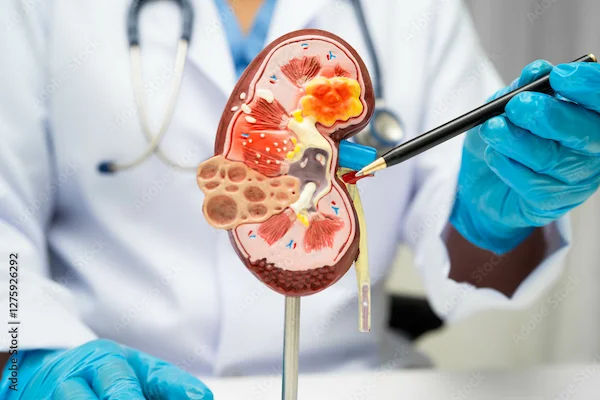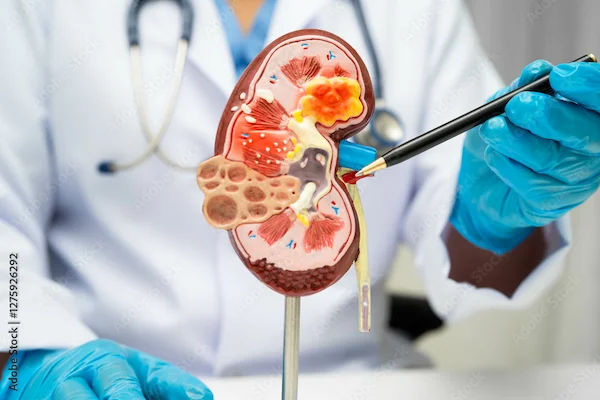Do They Remove A Bad Kidney After Transplant
Are your old kidneys removed during or after a transplant? Discover why diseased native kidneys are typically left in place, where the new donor kidney is positioned, and rare instances when removal might be necessary.

Written by
Last updated on 14th Jul, 2025
_3.webp?tr=q-80,f-webp,w-350,dpr-2,c-at_max 700w)
Introduction
If you or a loved one is preparing for a kidney transplant or has already undergone one, you might wonder: What happens to the old, damaged kidney? Is it removed during or after the transplant?
This is a common question, and the answer depends on individual health conditions. Let’s break it down in simple terms.
Why Would a Kidney Need to Be Removed?
Most people are born with two kidneys, but if one fails due to disease, injury, or chronic conditions like diabetes or high blood pressure, a transplant may be needed. However, the failed kidney isn’t always removed.
When Is the Bad Kidney Removed?
The bad kidney is removed when:
Medical Necessity – If the damaged kidney is causing complications such as:
Severe infections (e.g., recurrent kidney infections or abscesses)
Uncontrolled high blood pressure (due to kidney disease)
Kidney cancer or large cysts
Persistent pain
In such cases, doctors may recommend removing the diseased kidney before or during the transplant.
Space Concerns – In some cases, especially in small adults or children, the surgeon may remove the old kidney to make room for the new one.
Polycystic Kidney Disease (PKD) – If the kidneys are enlarged due to cysts, they may be removed to prevent discomfort or complications.
When Is the Kidney Left in Place?
Most often, the failed kidney is not removed unless absolutely necessary. Here’s why:
The body can function well with one healthy kidney (the transplanted one).
Surgery to remove a kidney adds extra risk, especially if the patient is already undergoing a major transplant procedure.
The old kidney may still produce small amounts of urine or hormones, which can be beneficial.
Consult Top Specialists for Personalised Tips
How Is a Kidney Removed? (If Needed)
If removal is required, it is usually done in one of two ways:
1. Nephrectomy (Surgical Removal) – This can be done:
Before the transplant (if infections or other risks exist).
During the transplant (if space is needed).
After the transplant (if complications arise later).
2. Laparoscopic (Minimally Invasive) Surgery – Small incisions are made, and a cameraguided instrument removes the kidney, leading to faster recovery.
Recovery After Kidney Removal
If a nephrectomy is performed:
Hospital stay is usually 2-4 days.
Full recovery may take 4-6 weeks.
Pain and discomfort are managed with medications.
What Happens If the Kidney Stays In?
If the old kidney remains:
It usually shrinks over time and doesn’t interfere with the new kidney.
Rarely, it may cause pain or infections, requiring later removal.
When to Consult a Doctor
If you experience:
Severe pain in the old kidney area
Frequent infections
Unexplained fever or blood in urine
…consult your nephrologist immediately.
Final Thoughts
Most kidney transplant recipients keep their failed kidneys unless there’s a medical reason to remove them. Your doctor will assess risks and benefits before deciding. If you have concerns about your kidney health or need a consultation, Apollo 24|7 provides expert nephrology care. You can book an appointment or schedule tests easily online.
Consult Top Nephrologist
Consult Top Specialists for Personalised Tips
Dr Ch Sashidhar
Nephrologist
20 Years • MBBS, MD General Medicine, DNB, Nephrology
Secunderabad
Apollo Hospitals Secunderabad, Secunderabad

Dr Praveen Kumar Etta
Nephrologist
10 Years • MBBS,MD DM(SGPGI) FORMER ASST(PIMS)
Hyderabad
Apollo Spectra Ameerpet, Hyderabad

Dr. Pardha Saradhi
Nephrologist
9 Years • MBBS, MD-DNB (Gen. Med.), DNB (Nephro)
Hyderabad
Apollo Hospitals D R D O kanchanbagh, Hyderabad
(50+ Patients)

Dr. Aswini Kumar Panigrahi
Nephrologist
23 Years • MBBS, MD (Int. Med.), DNB Nephro
Hyderabad
Apollo Hospitals Jubilee Hills, Hyderabad
(200+ Patients)

Dr. Jignesh Pandya
Nephrologist
27 Years • MD(Medicine), DNB(Nephrology).
Bilaspur
Apollo Hospitals Seepat Road, Bilaspur
(25+ Patients)
Consult Top Nephrologist
Dr Ch Sashidhar
Nephrologist
20 Years • MBBS, MD General Medicine, DNB, Nephrology
Secunderabad
Apollo Hospitals Secunderabad, Secunderabad

Dr Praveen Kumar Etta
Nephrologist
10 Years • MBBS,MD DM(SGPGI) FORMER ASST(PIMS)
Hyderabad
Apollo Spectra Ameerpet, Hyderabad

Dr. Pardha Saradhi
Nephrologist
9 Years • MBBS, MD-DNB (Gen. Med.), DNB (Nephro)
Hyderabad
Apollo Hospitals D R D O kanchanbagh, Hyderabad
(50+ Patients)

Dr. Aswini Kumar Panigrahi
Nephrologist
23 Years • MBBS, MD (Int. Med.), DNB Nephro
Hyderabad
Apollo Hospitals Jubilee Hills, Hyderabad
(200+ Patients)

Dr. Jignesh Pandya
Nephrologist
27 Years • MD(Medicine), DNB(Nephrology).
Bilaspur
Apollo Hospitals Seepat Road, Bilaspur
(25+ Patients)
_7.webp)
_9.webp)

_11.webp)
